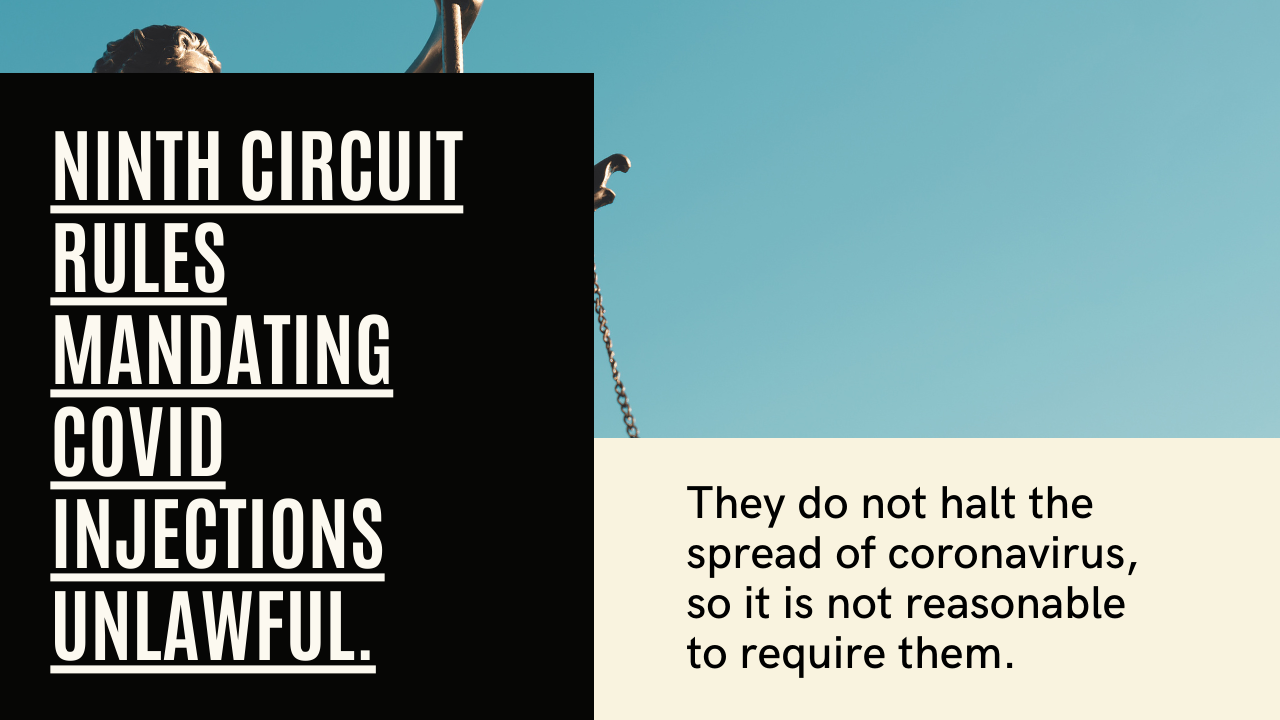Executive
COVID injections NOT vaccines – Appeals Court

A federal district court yesterday held that mRNA-style injections, ostensibly intended to ward off coronavirus, do not qualify as vaccines. This calls into question any remaining COVID vaccine mandates. It also weakens the position of the Centers for Disease Control and Prevention (CDC) after they watered down the definition of the word vaccine to help those injections pass muster. The court applied traditional medical definitions – and in so doing, held that it would accept only traditional medical definitions.
A COVID vaccine mandate goes down
The thirty-three-page decision from the United States Court of Appeals for the Ninth Judicial Circuit is available here. Jim Hoft of The Gateway Pundit provided a brief syllabus.
The case, Health Freedom Fund, California Educators for Medical Freedom, et al. v. Carvalho et al., involved a suit against the Superintendent of Schools, the Chief Human Resource (“Personnel”) Officer, and several members of the governing board of the Los Angeles Unified School District (LAUSD). LAUSD had a vaccine mandate in place and insisted that all its faculty and staff take the mRNA COVID injections by a date certain. The plaintiffs sued, alleging infringement of their freedom to refuse treatment per their own discretion. But to quash arguments that their refusal would endanger others, they argued that the COVID injections do not prevent transmission. Therefore, plaintiffs’ refusal to take them could not possibly threaten others with any sort of harm.
The court found, two to one, for the plaintiffs. Judges Ryan D. Nelson delivered the opinion of the panel, in which Judge Daniel P. Collins joined, and also filed a solo concurrence. Judge Michael Daly Hawkins dissented. This should surprise no one who knows their histories. Judges Nelson and Collins both received their nominations from Donald J. Trump; Judge Hawkins received his from Bill Clinton.
How the case turned
The case turned on an interpretation of the Supreme Court’s 1905 case Jacobson v. Massachusetts, 197 U.S. 11 (1905). That case held that vaccination mandates were reasonable to stop the spread of smallpox. Jacobson depended on two things: the high case-fatality rate of smallpox, and the efficacy of vaccination in preventing transmission. Therein lay the problem, according to the court: COVID injections do not prevent transmission. Therefore the Jacobson case does not allow anyone to mandate them – for they are not “vaccines” within that case’ meaning.
Judge Hawkins, dissenting, noted that LAUSD had already revoked the mandate. Therefore, said he, the case was moot. Not so, said the majority – because LAUSD had a history of withdrawing, then reinstating, mandates. And also because LAUSD had clearly telegraphed that they were waiting to see what the Court did before deciding whether or not to reimpose the COVID injection mandate. The court sent a clear message: “Don’t.”
The CDC has watered down their definition
Separately, Hoft reminded his readers that the CDC watered down their definition of a vaccine three years ago. Before August of 2021, they used this definition:
Vaccine– “a product that stimulates a person’s immune system to produce immunity to a specific disease.”
After that date, they changed to this definition:
Vaccine– “a preparation that is used to stimulate the body’s immune response against diseases.”
But clearly the Ninth Circuit – or at least this panel – relied on the original and traditional definition. That was the definition that prevailed in 1905 when Mr. Jacobson petitioned the Supreme Court for relief from a Massachusetts smallpox vaccine law.
Judge Collins’ concurrence spoke more directly to medical freedom. But his analysis – with many more precedents to back it up – spoke only to the right of a patient to refuse treatment for that patient’s benefit. Thus far no court has spoken to the right to refuse treatment given for the benefit of others. By that standard, the only reason plaintiffs prevailed is that the COVID injections confer no benefit upon nearby human beings. Must any such benefit to others override the fundamental right to refuse treatment? And if so, when does that override apply? Never once did the country witness “meat wagons” rolling down residential streets, with roof-mounted bullhorns blaring “Bring out your dead!” If not for the absence of any discernible benefit to others, this could have been the case to take to the Supreme Court to consign Jacobson v. Massachusetts to the Justicial dustbin of erroneous, anti-libertarian decisions.
Terry A. Hurlbut has been a student of politics, philosophy, and science for more than 35 years. He is a graduate of Yale College and has served as a physician-level laboratory administrator in a 250-bed community hospital. He also is a serious student of the Bible, is conversant in its two primary original languages, and has followed the creation-science movement closely since 1993.
-

 Accountability3 days ago
Accountability3 days agoWaste of the Day: Principal Bought Lobster with School Funds
-

 Executive1 day ago
Executive1 day agoHow Relaxed COVID-Era Rules Fueled Minnesota’s Biggest Scam
-

 Civilization9 hours ago
Civilization9 hours agoWhy Europe Shouldn’t Be Upset at Trump’s Venezuelan Actions
-

 Constitution2 days ago
Constitution2 days agoTrump, Canada, and the Constitutional Problem Beneath the Bridge
-

 Civilization1 day ago
Civilization1 day agoThe End of Purple States and Competitive Districts
-

 Christianity Today9 hours ago
Christianity Today9 hours agoSurprising Revival: Gen Z Men & Highly Educated Lead Return to Religion
-

 Civilization5 days ago
Civilization5 days agoThe devil is in the details
-

 Executive21 hours ago
Executive21 hours agoWaste of the Day: Can You Hear Me Now?











As I followed the real information the only people getting infected over and over are who took the injection that were supposed to protect from infection.